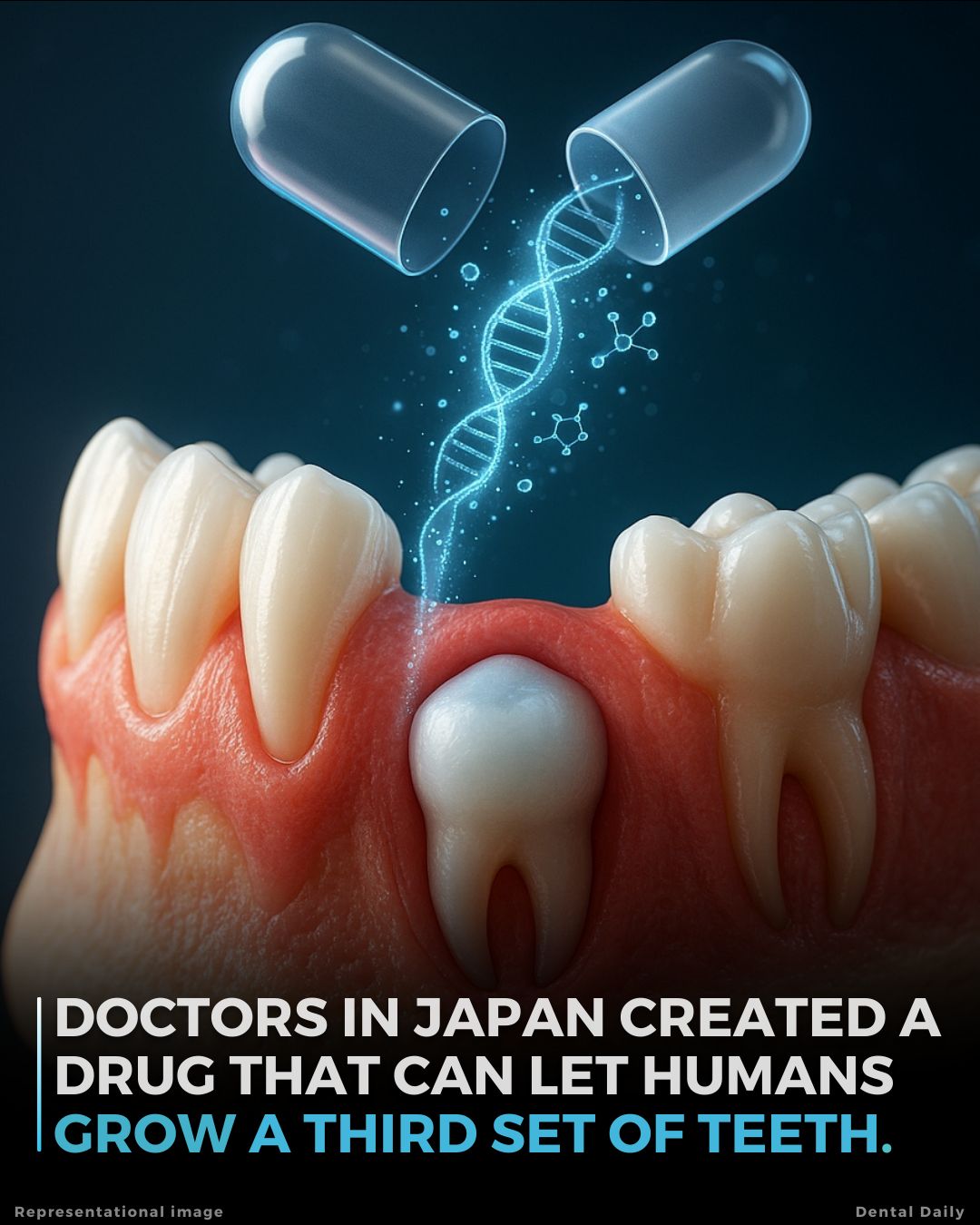
 Humans may soon regrow lost teeth!
Humans may soon regrow lost teeth!
A team of doctors in Japan has developed a groundbreaking drug that could allow people to naturally grow a brand-new tooth.
Instead of relying on dentures or implants, this treatment activates the body’s own ability to produce another set of teeth. The research is led by Dr. Katsu Takahashi at Kitano Hospital’s Medical Research Institute. His team discovered that by blocking a protein called USAG-1—which normally prevents extra teeth from forming—they could trigger tooth growth. In experiments with mice, the treatment worked successfully. Now, human clinical trials are being prepared, with hopes of making the therapy available by 2030.
Scientists believe humans may still have hidden “third set” tooth buds, just waiting to be switched on. This idea is inspired by animals like sharks and elephants, which naturally replace their teeth throughout life. Combined with advances in dental tissue and bone regeneration, researchers are confident that reversing tooth loss biologically is within reach.
If all goes well, the next decade could make tooth regrowth a real option for millions of people who lose teeth due to age, injury, or disease.
Source: Ravi, V., Murashima-Suginami, A., Kiso, H., Tokita, Y., Huang, C.L., Bessho, K., Takagi, J., Sugai, M., Tabata, Y., Takahashi, K. Advances in tooth agenesis and tooth regeneration. Regenerative Therapy, Vol 22, March 2023, Pages 160–168.
Tooth replacement involves using an artificial appliance, like dental implants, dental bridges, or dentures, to replace missing teeth and restore function and appearance. Dental implants are a permanent surgical option where a titanium post is anchored in the jawbone, supporting a crown. Dental bridges are fixed restorations, either supported by adjacent natural teeth or dental implants, to fill the gap. Dentures are removable prosthetics, ranging from partial to complete sets, that rest on the gums and jaw
-
- What it is: A surgical procedure where a titanium screw is placed into the jawbone to serve as a new tooth root.
- How it works: After the implant fuses with the bone (a process called osseointegration), an abutment is attached, and then a custom-made crown (the artificial tooth) is placed on top.
- Pros: Offers a permanent, reliable, and stable solution that looks and feels like a natural tooth.
- Cons: Can be a lengthy process, taking several months to complete, and may be more costly than other options.
- What it is: A surgical procedure where a titanium screw is placed into the jawbone to serve as a new tooth root.
-
- What it is: A restoration that replaces one or more missing teeth by spanning the gap and being anchored to adjacent teeth or implants.
- How it works: For a tooth-supported bridge, the adjacent teeth are prepared, and the bridge is cemented onto them. An implant-supported bridge uses implants as the anchor points.
- Pros: A stable and less lengthy option for replacing one or more teeth in a row.
- Cons: Requires preparation of healthy, adjacent teeth for support (in a tooth-supported bridge).
- What it is: A restoration that replaces one or more missing teeth by spanning the gap and being anchored to adjacent teeth or implants.
-
- What it is: Prosthetic devices that replace missing teeth and can be removable or fixed.
- How it works: Partial dentures replace a few missing teeth and are held in place by clasps on remaining teeth. Complete dentures replace all teeth in an arch.
- Pros: A simpler and more affordable option compared to implants, suitable for multiple missing teeth.
- Cons: Removable dentures are less stable than permanent options.
- What it is: Prosthetic devices that replace missing teeth and can be removable or fixed.
Other Options
-
A temporary, removable partial denture that is often used as a placeholder while waiting for a more permanent solution.
-
Do Nothing:While seemingly the least expensive, not replacing a missing tooth can lead to further dental problems and higher costs in the long run.
-
Number of missing teeth:
Different options are suited for single, multiple, or all missing teeth.
-
Budget:
Replacement options vary in cost, with implants generally being the most expensive.
-
Timeframe:
Some options, like implants, are permanent but time-consuming, while others are temporary or fixed bridges that can be completed more quickly.
-
Personal preference:
Some people prefer the stability and permanence of implants, while others prefer the removable nature of dentures.


